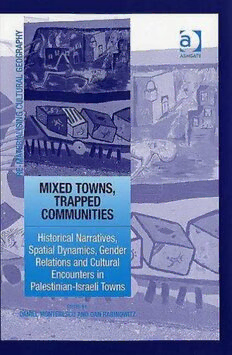
Mixed Towns, Trapped Communities: Historical Narratives, Spatial Dynamics, Gender Relations and Cultural Encounters in Palestinian-israeli Towns (Re-Materialising Cultural Geography) PDF
338 Pages·2007·1.703 MB·English
Most books are stored in the elastic cloud where traffic is expensive. For this reason, we have a limit on daily download.
Preview Mixed Towns, Trapped Communities: Historical Narratives, Spatial Dynamics, Gender Relations and Cultural Encounters in Palestinian-israeli Towns (Re-Materialising Cultural Geography)
Description:
Modern urban spaces are, by definition, mixed. In many ways, their success lies in the richness of their ethnic variety and ongoing exchange of cultural traits and ideas, but this mixture is not necessarily harmonious. Focusing not on capital cities or the holy sites which are so heavily associated with Middle Eastern Urban space, but on Palestinian-Israeli mixed towns, this book theorizes the relationship between modernity, the concept of the nation and the dynamics which engender and characterize the growth of urban spaces. In these mixed towns, Arabs and Jews have been interacting for decades in workplaces, residential areas, commerce, culture and politics. A new generation of Israeli, Palestinian and other scholars come together to question whether these towns are perceived as utopian or dystopian and whether they are best portrayed as divided, polarized, contested or colonial cities. In doing so, they explore how national identity, urban space, gender relations and cultural encounters are represented and produced in ethnically divided spaces.
See more
The list of books you might like
Most books are stored in the elastic cloud where traffic is expensive. For this reason, we have a limit on daily download.
